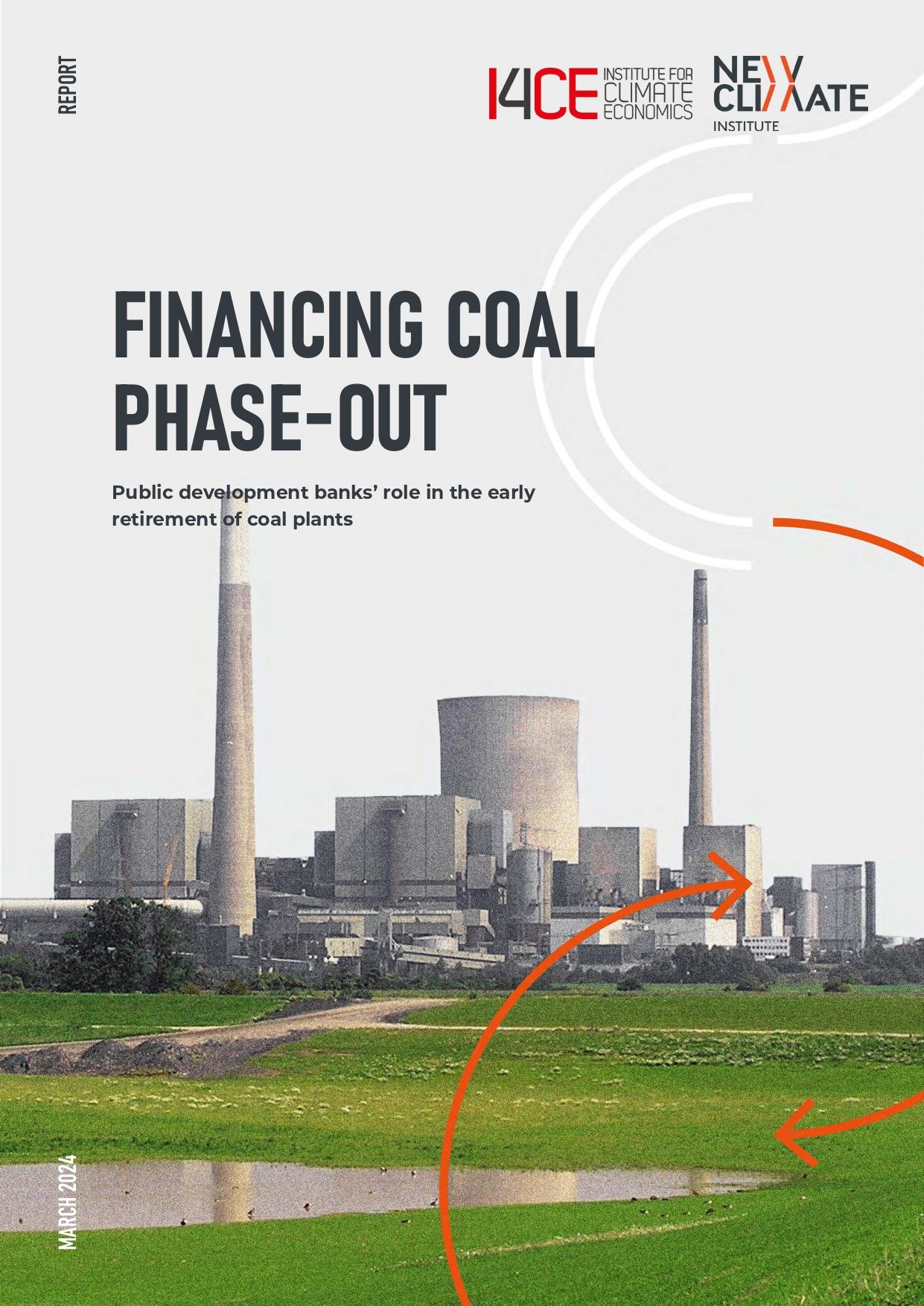Financing Coal Phase-out: Public Development Banks’ Role in the Early Retirement of Coal Plants
Public development banks have the potential to facilitate the transition from coal to renewable alternatives in developing and emerging countries by fostering conditions conducive to the early retirement and repurposing of coal plants. Co-written with NewClimate Institute, this report highlights the challenges associated with the early retirement of coal plants and examines public development banks’ role in collaborating with national governments and power producers to support coal phase-out.
Limiting global average temperature rise to 1.5°C requires stopping the construction of new coal power plants and the early retirement of a large number of existing plants before the end of their technical lifetimes. This presents a major challenge as coal supplied more than one-third of global electricity generation in 2023, with Southeast Asia, China, and India accounting for the largest share of current coal capacity in operation. Early retirement of coal assets, coupled with the expansion of renewable energy, is crucial to advance the decarbonisation of the global power sector. Early retirement can facilitate significant emissions reduction and holds economic and sustainable development advantages. Given the diminishing cost of renewables and energy storage and the potential for public health benefits, there is an overwhelming case for swiftly phasing out coal in line with long-term decarbonisation pathways. However, there are a number of barriers to the phase-out of existing plants that prevent market forces in favour of renewables and limit sustainable development gains.
A growing number of policymakers and public development banks, including multilateral development banks and other bilateral development finance institutions, are actively exploring strategies to accelerate the retirement of existing coal plants, extending beyond the exclusion of coal from direct financial support. With the support public development banks can provide, from advisory services and technical assistance to different forms of financing, they are uniquely positioned to help address these barriers and support countries with the transition to decarbonised electricity systems. However, these efforts may carry risks of unintended adverse impacts, such as indirectly supporting new natural gas capacity. Other forms of engagement, such as transition finance and compensation payments, may also pose unique risks depending on how they are used. The risks include moral hazard and inefficient use of public funds, and setting perverse incentives, which could impede coal phase-out.
I4CE and NewClimate Institute reviewed the instruments that public development banks have at their disposal to help address barriers and the associated challenges and risks, and examined existing phase-out initiatives as case studies. Our work underscores the importance of seeking firm commitments from partner country governments and other stakeholders to stop future fossil fuel investments, reduce current pipelines to avoid emission leakage and moral hazard risks, and prevent backtracking on coal phase-out in the event of political turnover. We break down the instruments by the stakeholders that public development banks may engage with, considering their different roles in the power system: national policymakers, utilities, and independent power producers (IPPs). National policymakers are the ultimate decisionmakers on a country’s fossil fuel phase-out ambition and power system reforms; therefore, engagement often aims to strengthen policymaking and support ambition. On the other hand, engagement with power producers, whether utilities or IPPs, also requires a different approach to address distinct transition barriers. Based on a review of existing literature and interviews with experts and practitioners, the main considerations for public development banks when engaging in coal phase-out efforts are:
When engaging with national governments, public development banks should:
- Assist countries in defining ambitious and Paris-aligned long-term low-emissions development strategies before further engaging stakeholders on coal phase-out. Ensure that early retirement efforts are consistent with these long-term strategies.
- Assist governments in building their capacity to set coal phase-out targets and plan and implement the early retirement of coal-fired power plants. For example, through knowledge sharing, targeted technical assistance, and initiatives supporting just transition planning.
- Provide financial support to support ambitious energy policy and institutional reforms. For example, through policy-based lending and technical assistance.
- Support the issuance of sustainability-linked sovereign bonds that contribute to transforming local economies towards low-emissions and climate-resilient systems.
- Seek to increasingly engage with national development banks to facilitate the transition from coal.
When engaging with utilities, public development banks should:
- Avoid pursuing buyouts of coal plants at the asset level but instead support utilities in changing their business model to enable them to attract private capital for renewable energy investments.
- Avoid moral hazard and ensure that transition finance does not undermine climate objectives by addressing loopholes that may lock in business-as-usual pathways and defining ambitious key performance indicators.
- Continue to focus on efforts to finance the win-wins of renewable energy, energy storage, and smart grids, as well as supporting decommissioning and remediation.
When engaging with IPPs, public development banks should:
- Consider buying out IPPs only under very limited circumstances (i.e., when there is a government commitment to coal phase-out to avoid emission leakage).
- Facilitate legal review of power purchase agreements (PPAs) and support innovative financing mechanisms to terminate, replace, and potentially restructure PPAs.
- Engage through transparent and competitive market mechanisms to overcome information asymmetry and ensure public funds are used efficiently.

